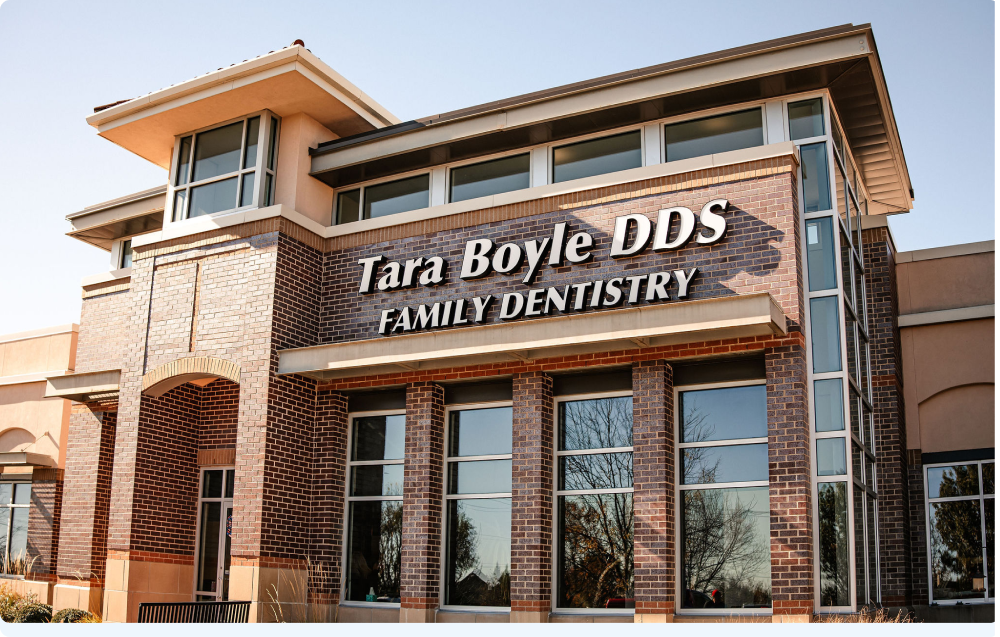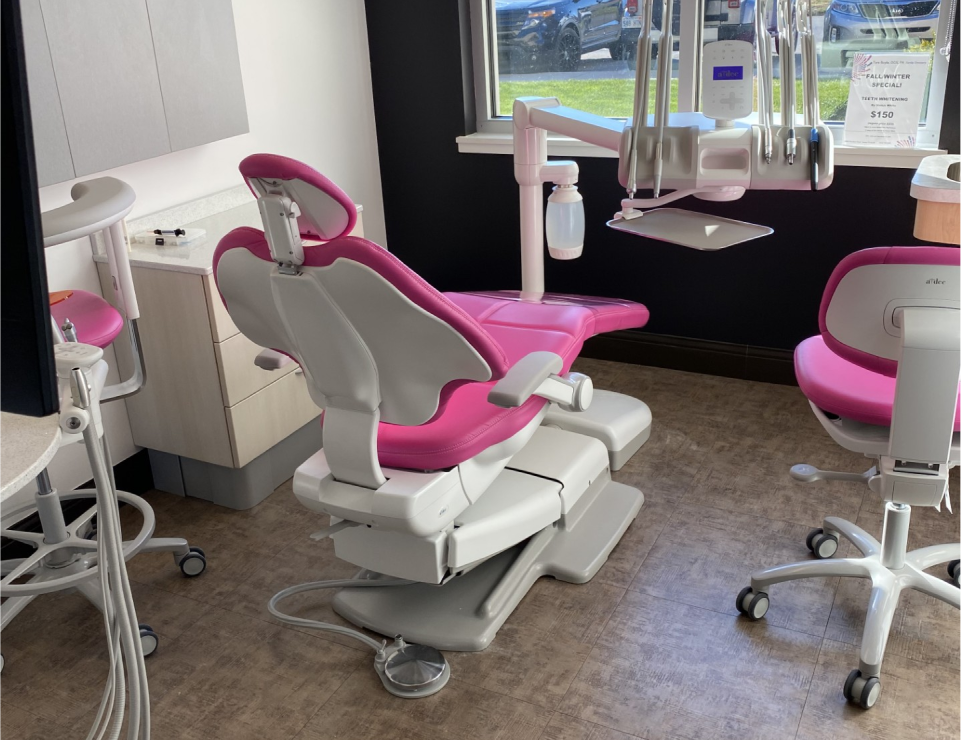
General and Cosmetic Dentistry
Tara Boyle, DDS Family Dentistry
10040 Woodland Dr, Lenexa, KS 66220, United States
Tara Boyle, DDS Family Dentistry, offers a wide range of cutting-edge treatments and services such as:
Cosmetic Dentistry
Improvement in dental aesthetics in color, position, shape, size, alignment, and overall smile appearance.
Invisalign
Invisalign® aligners demonstrate that effective orthodontic treatment doesn’t have to be burdensome. These innovative appliances will help you straighten your teeth and achieve a better-looking smile.
Implants
Dental implants are a highly dependable option for replacing missing teeth. Implants can replace one tooth or multiple. They are a great permanent solution to keeping both the appearance and functionality of your teeth.
Oral Surgery
Oral surgery includes any procedures more invasive than general dentistry including: tooth extractions, dental implants, and tissue grafts.
Preventative Care
Preventive dental care is a combination of actions and procedures that help prevent oral health issues and maintain a healthy smile.
Patient education
The goal of dental health education is to help people develop good oral health habits that can improve their overall health and reduce dental healthcare costs.
Want to make an appointment easily?
Your Smile Matters – Reach Out Anytime for Questions or Support!

The Office
Our goal is to provide quality dental care using tried and true products along with state-of-the-art equipment.
We meticulously seek the best local labs for fabricating our patients' dental needs. Our staff regularly attends continuing education courses in order to stay abreast of the latest dentistry practices.
Monday to Wednesday 7:00 AM - 7:00 PM
Thursday 7:00 AM - 5:00 PM
Friday 8:00 AM - 3:00 PM

Our Team
At Tara Boyle, DDS Family Dentistry, we are committed to delivering outstanding dental care in a welcoming and relaxing environment.
We combine advanced training with a warm, approachable style to ensure every patient feels at ease. With a focus on personalized treatment and a passion for creating healthy, beautiful smiles, we look forward to helping you achieve your dental goals with confidence!
Frequently Asked Question
We Got You Covered
Why should I have my teeth cleaned every six months?
Professional cleanings every six months are important for overall dental health — even for those who brush their teeth thoroughly twice a day and floss regularly. The hygienist removes built-up plaque and tartar in hard to reach spaces that brushing and flossing can miss. Regular cleanings help prevent cavities and the onset of gum disease.
If you experience tartar build-up at a faster rate than the average person, it’s possible that the frequency of your cleanings may need to be increased.
Don’t forget that if you have dental insurance, most plans cover two cleanings per year. Also, professionally cleaned teeth feel great, look better, and leave you with the satisfaction that you’ve done a good deed not only for your teeth but also for your overall health.
It’s been a long time since I’ve visited the dentist. What do I need to do?
You’re not alone! Whether it’s been 6 months or 6 years, it’s never too late to get back into the routine.
At our dental office, we can arrange for you to have a thorough and educational exam appointment. We have been taking care of people just like you for over 20 years – take advantage of our experience! We’re here to help!
What can I expect during a dental check-up?
At a dental check-up you can expect to update a health history in the beginning. Any recommended x-rays will be taken to evaluate your dental health. If you are scheduled for a teeth cleaning, a dental hygienist will clean your teeth, review hygiene habits, and review at home care. The dentist will come in for an exam and evaluate any treatment needed. You should leave your appointment understanding any treatment discussed and with an idea of your dental benefit
What causes teeth to decay?
Demineralization and bacteria are the main reasons for tooth decay. Other factors are home care, diet, and ongoing health issues.
What are sealants, and when are they used?
If you run your tongue over your teeth, you’ll notice something: Rather than having a smooth surface, they’re groovy. And you can’t always clean these grooves properly so food can get trapped, which can lead to cavity-causing bacteria to flourish.
A sealant is a thin, protective coating adhered to your teeth, especially the chewing surface of your molars. The use of sealants can be an effective preventive measure in keeping food particles from reaching deep crevices that can be hard to clean.
Children are especially good candidates for sealants. Their young teeth have yet to experience decay, which makes it a great time to apply a sealant. In addition, children’s teeth have not fully calcified. That means those nooks and crannies are actually deeper in their teeth than in adults — and therefore can be even more difficult to thoroughly clean.
The American Dental Association reports that sealants can reduce the risk of decay in molars by nearly 80%, and the Centers for Disease Control has found that children without sealants had three times as many cavities compared to those with sealants.
For any questions or concerns about the use of sealants, be sure to talk to your dentist.
What is in amalgam (silver) fillings, and are they safe?
Dental amalgam is a filling material used by dentists to restore the proper size and shape of decayed or damaged teeth. It is an alloy, meaning a blend of different metals, that includes silver, tin, copper, and liquid mercury.
Despite controversy over the mercury content, no health disorder or illness has ever been found to be linked to it. The FDA, CDC, and World Health Organization all view dental amalgam as a safe dental material.
If you are unsure whether amalgam is right for you, discuss the advantages and disadvantages of each filling material with your dentist.
Does having a cavity always mean that my tooth will hurt?
The occurrence of pain in a tooth signifies the problem has reached a more advanced stage. That’s why you shouldn’t wait until a tooth hurts. Having regular dental exams can lead to a cavity being caught early — and that’s good news. Yes, the cavity will still need to be filled; however, a cavity that goes undetected until it’s causing pain can possibly mean that it will be more difficult — and expensive — to fix.
What can I do to fix or replace a missing tooth?
You may wonder why replacing a tooth is necessarily at all. What’s important to understand is that a missing tooth can initiate a whole series of undesirable, even harmful, consequences. For example, your chewing habits will likely be adversely affected, and, on top of that, your other teeth may shift to fill in the gap caused by the missing tooth, leading to serious bite problems.
Your options for replacing a missing tooth will depend on where the tooth gap is located. The most common recommendations for replacing a missing tooth include a bridge, a partial denture, or a dental implant. Each of these options has specific pros and cons, which can be discussed with your dentist.
What can I do if I have a dry mouth?
The basic problem in dry mouth is a lack of saliva. This can be caused by diseases of the salivary gland, medications that decrease salivary flow as a side effect or as a natural result of aging. This decrease in saliva can lead to a number of severe dental problems such as gum disease, tooth decay and mouth infections.
The best way to combat this problem is to use sugar free
gum, drink plenty of water and extra fluoride toothpaste, gel carriers and fluoride varnish treatments. Several over the counter products are also available that can help with some dry mouth symptoms. If you’re concerned that you may have xerostomia, contact your dentist or physician to determine its cause and see what might work best in your situation.
What are my options for whitening my teeth?
At our office we have two options. We can make custom whitening trays for you. You will be given whitening gel to place in your trays to wear for about 1-2 hours a day until desired whitening shade is achieved. Alternatively, you can try Professional strength Crest White Strips. Teeth whitening is not for everyone, so make sure you talk to your dentist about your options.